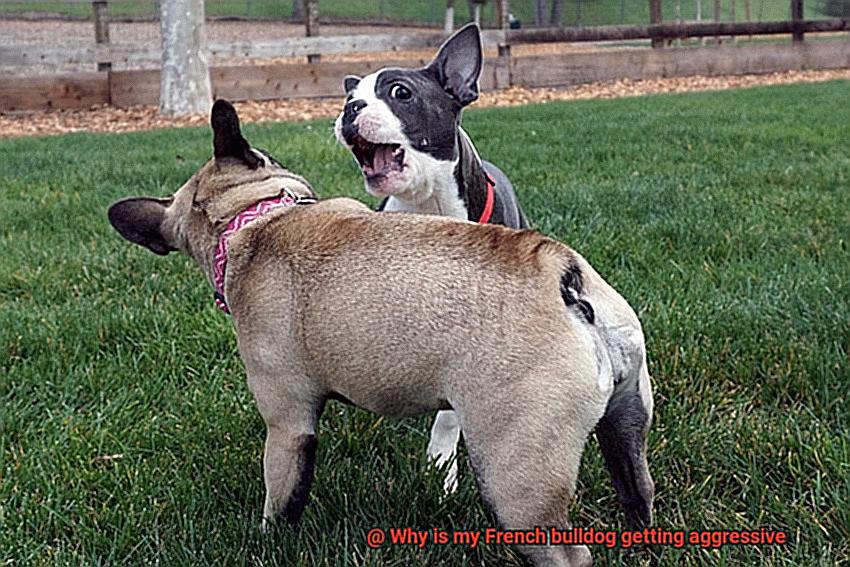Why is my French bulldog getting aggressive?
Are you concerned about your French Bulldog’s increasing aggression? Knowing the cause of the aggressive behavior is key to helping your pup. While some level of aggression is normal for French Bulldogs, frequent or intense outbursts may indicate an underlying issue.
In this blog post, we’ll explore potential causes of aggression in French Bulldogs, such as fear or anxiety, dominance issues, medical problems, a lack of preparation and socialization, boredom or apprehension, and genetics. We’ll also discuss how to handle your dog’s aggression and prevent future outbursts.
By understanding why your Frenchie is getting aggressive and taking action in a positive way, you can ensure that both you and your pup are safe and happy. Let’s get started.

Genetics and Aggression in French Bulldogs
Contents
- 1 Genetics and Aggression in French Bulldogs
- 2 Medical Causes of Aggression in French Bulldogs
- 3 Environmental Causes of Aggression in French Bulldogs
- 4 Signs of an Aggressive French Bulldog
- 5 How to Handle an Aggressive French Bulldog
- 6 Tips for Preventing Aggression in French Bulldogs
- 7 Training Your French Bulldog to be Non-Aggressive
- 8 When to Seek Professional Help for Your Frenchie’s Aggression
- 9 Conclusion
Many owners of this beloved breed are concerned about it. While French Bulldogs are typically known for their sweet and loving nature, they can become aggressive in certain situations.
It’s important to recognize that genetics, environmental factors, and medical conditions all play a role in a French Bulldog’s impulsive behavior. Research has revealed that certain variants of the CDH2 gene and MAOA-L gene are linked to canine aggression, including French Bulldogs. Furthermore, inadequate socialization, fear, anxiety, or medical issues such as thyroid dysfunction or brain tumors can also contribute to aggression in this breed.
Fortunately, there are steps that owners can take to reduce and manage aggression in their French Bulldogs. Early socialization and avoiding punishment-based training methods can help minimize the risk of violence. Additionally, obtaining veterinary care for any potential medical problems and working with a professional dog trainer or animal behaviorist can also be beneficial in addressing any behavioral issues.
In the end, understanding the dangers of aggression in French Bulldogs is essential to ensure the safety and wellbeing of both the dog and the owner.
Medical Causes of Aggression in French Bulldogs
Aggression is an unexpected trait for the popular and affectionate French Bulldog breed. If your pup has become aggressive, it may be time to investigate the medical causes.
Pain can be a major factor in the development of aggression in French Bulldogs. Whether it’s from an accident or a chronic illness, dogs that are in pain may lash out at anyone who gets too close. If you suspect that your dog is in pain, it’s essential to seek veterinary assistance right away.
Epilepsy can also lead to aggression in French Bulldogs. Seizures can cause sudden and unpredictable outbursts of violence, so if you notice any changes in your dog’s behavior, please consult with your veterinarian immediately.

Hormonal imbalances, such as an underactive thyroid, can also be a cause of sudden aggression in these dogs. That’s why regular vet visits are so important for maintaining your pup’s health and happiness.
Finally, Rage Syndrome is a rare genetic disorder that can cause sudden and intense outbursts of aggression in French Bulldogs. Although there is no definitive test for this disorder, veterinarians diagnose it based on behavioral observations.
Environmental Causes of Aggression in French Bulldogs
If your beloved French Bulldog is exhibiting aggression, environmental factors may be to blame. A French Bulldog’s environment can have a huge impact on their behavior, with certain stressors potentially causing them to become aggressive.
For instance, inadequate socialization can lead to aggression in French Bulldogs. If not socialized correctly from an early age, they may become anxious or fearful around people or other animals, which can result in violence.
Moreover, changes in routine or surroundings can also cause aggression in French Bulldogs. They rely on routine and structure for comfort and security, so any disruption to this can cause stress and anxiety that may manifest as aggressive behavior.
It’s essential to identify the environmental stressors that could be causing your French Bulldog’s aggression and address them promptly. Providing your Frenchie with enough space, regular exercise, mental stimulation, structure and clear boundaries – as well as avoiding stressful situations – can help reduce aggression in French Bulldogs.
Signs of an Aggressive French Bulldog
Aggression in French Bulldogs is a serious matter and should be addressed promptly. If your Frenchie is exhibiting any of the signs listed above, it’s best to take immediate action and seek help from a professional dog trainer or behaviorist.
From growling and snarling to lunging and biting, these are all indicators that your pup is feeling threatened or uncomfortable. Stiff body language, intense eye contact, and raised hackles can also be signs of aggression in French Bulldogs.
It’s important to note that French Bulldogs are bred to be companion dogs, so they may become fearful of their owners if not given the proper care. To ensure their safety and happiness, provide them with ample space, exercise, mental stimulation, structure, and boundaries.
By recognizing the signs of aggression in your French Bulldog early on and taking action right away, you can prevent any harm from coming to yourself or others while still providing a safe environment for you both.
How to Handle an Aggressive French Bulldog
When it comes to handling an aggressive French Bulldog, it is essential to identify the source of their aggression. It could be due to genetics, medical conditions, or environmental factors. Consulting with a veterinarian and experienced dog trainer can help pinpoint the underlying cause and provide a plan for handling it.
Positive Reinforcement Training
Positive reinforcement training is a successful method for managing an aggressive French Bulldog. By rewarding good behavior and ignoring or correcting negative behavior, you can help your Frenchie learn more appropriate ways to react and communicate.
Establishing Boundaries and Establishing Yourself as Alpha
Setting clear boundaries and rules for your Frenchie is key, as well as establishing yourself as the alpha in the household. This can help reduce feelings of anxiety or mistrust that may be contributing to their aggressive behavior.
Severe Cases
In severe cases of aggression, medication may be prescribed by a veterinarian to help manage their behavior. It’s important to note that medication should always be used in conjunction with behavior modification training, not in place of it.
Patience, Consistency, and Professional Guidance
Handling an aggressive French Bulldog requires patience, consistency, and professional guidance from an experienced dog trainer or behaviorist.
Tips for Preventing Aggression in French Bulldogs
French Bulldogs are usually known for their friendliness and loyalty, but just like any other dog breed they can display aggression if they feel threatened or uncomfortable in certain situations. As a responsible pet owner, it’s essential to take the necessary steps to prevent any aggressive behavior from your French Bulldog.
Here are some tips to help prevent aggression in French Bulldogs:
Socialization is essential
Start socializing your French Bulldog as soon as possible, preferably between 3 and 14 weeks of age, so that they become comfortable and confident around different people, animals, and environments. This will help prevent fear-based aggression.
Positive reinforcement
Positive reinforcement is the most effective way to teach your French Bulldog desirable behavior and discourage aggression. Reward good behavior with treats, toys, praise, or attention instead of punishment or physical force. Consistency, repetition, and patience are key for successful training.
Supervision is necessary
Monitor your dog’s behavior and body language while they interact with unfamiliar dogs or children in order to intervene or redirect them if needed. This will help prevent accidents or conflicts that could trigger their aggression.
Exercise regularly
Exercise and mental stimulation are important for French Bulldogs to burn off excess energy and reduce anxiety levels that could lead to aggressive behavior. Playing games with them or taking them on walks can provide them with sufficient outlets for their natural instincts and needs.
Environment modification
Make changes to the environment that minimize or eliminate triggers of aggression such as providing a safe space for your dog to retreat to or using barriers or leashes when needed.
Seek professional help
If preventive measures fail to control or treat aggression in French Bulldogs, seek professional advice from a veterinarian, behaviorist, or trainer who can provide personalized techniques and medication for addressing the root causes of aggression and helping your dog lead a happier life.
Training Your French Bulldog to be Non-Aggressive
Training your French Bulldog to be non-aggressive is an essential part of owning this breed. French Bulldogs have a reputation for being friendly and loving, but every dog is an individual and their behavior is influenced by various factors. Socialization, training, and genetics all play a huge role in determining how well-behaved your Frenchie is.
Socialization
Socialization from a young age is key to preventing aggression in French Bulldogs. Expose them to various people, animals, and environments so they know how to communicate with others appropriately. This will make them feel confident in new situations and reduce stress-related aggression.
Positive reinforcement
Positive reinforcement training is also important for teaching your French Bulldog good behavior. It helps build a bond between you and your dog and teaches them basic commands such as sit, stay, come, and down which can help establish a clear hierarchy in the home. This can help prevent aggression as it gives your Frenchie clear expectations of their place within the household.
Genetics
Genetics can also play a role in French Bulldog aggression. The breed is predisposed to several health issues which can lead to aggression such as Brachycephalic Respiratory Syndrome (BRS) which can cause difficulty breathing leading to frustration or irritability or Rage Syndrome which causes sudden outbursts of aggression.
To prevent aggressive behavior in your French Bulldog it’s important to socialize them from an early age, use positive reinforcement training and establish yourself as the pack leader with clear rules that they understand.
TFKZq8oPeC4″ >
When to Seek Professional Help for Your Frenchie’s Aggression
As a French Bulldog owner, you know that these lovable pups can also be prone to aggression. While it is essential to work with your pup to reduce their aggressive behavior, sometimes professional help may be necessary.
When should you seek professional help? If your Frenchie’s aggression becomes increasingly frequent, intense or unpredictable, or if they begin to direct their aggression towards people or animals, causing harm or injury, it is time to seek help.
A certified dog behaviorist or trainer can identify the underlying causes of your pup’s aggression and provide tailored training and behavioral modification techniques. They can also create a management plan to keep your French Bulldog and others safe while working on reducing aggressive behaviors.
In severe cases, medication may be prescribed by a licensed veterinarian to reduce anxiety and improve overall behavior.
Also Read: Why is My French Bulldog Suddenly Aggressive? – Allfrbulldogs.com
Conclusion
It’s understandable to feel concerned when your French Bulldog starts behaving aggressively. To help ensure their safety and happiness, it’s important to understand the underlying causes of violence in this breed. Genetics, medical issues, environmental factors, and inadequate socialization can all contribute to aggression.
Fortunately, there are steps you can take to minimize and manage it. Early socialization and avoiding punishment-based training techniques will reduce the chance of violence. Additionally, getting veterinary care for any potential medical issues as well as working with a licensed dog trainer or animal behaviorist can also be helpful in addressing behavioral problems.
By recognizing signs of aggression early on and taking action – such as positive reinforcement training, establishing boundaries, providing exercise, and mental stimulation – you can avoid injury from approaching yourself or others while still providing a safe environment for you both.




